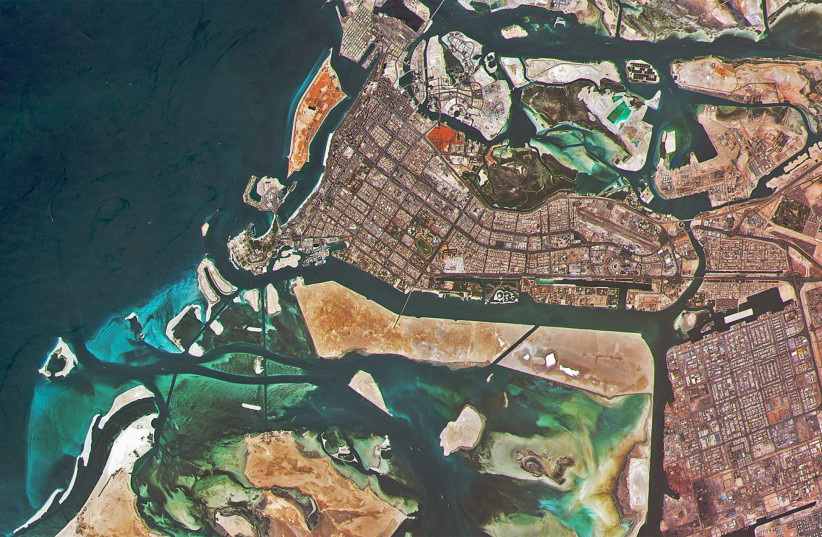Israeli companies looking to penetrate the vast Asian marketplace should start in Abu Dhabi, according to Abdulla Abdul Aziz AlShamsi, acting director-general of the Abu Dhabi Investment Office (ADIO).
“We have free trade agreements with Indonesia, India, Turkey and many others,” AlShamsi told The Jerusalem Post. “These are new markets from which Israeli companies can benefit. We are talking about billions of people and significant business that can be done just by being in Abu Dhabi.”
AlShamsi spent Wednesday at the OurCrowd Investment Summit in Jerusalem, where he aimed to find new Israeli technology leaders and companies interested in doing business in his country. He oversees ADIO’s efforts to grow and diversify Abu Dhabi’s economy through private-sector investment. He also oversees strategic initiatives that accelerate innovation in the emirate and enhance its reputation on the world stage.
About two years ago, ADIO established its first international representative office in Tel Aviv to promote collaborations and connections between innovation-focused companies and organizations in Abu Dhabi and Israel.
“Fundamentally, we are working on strengthening the commercial ties between Abu Dhabi and Israel,” AlShamsi said. “We started right on the back of the Abraham Accords by opening an office in Tel Aviv. We have integrated with the local system and are trying to make connections and create value for entrepreneurs or businesses based out of Israel for which we can offer a value proposition in Abu Dhabi.”

Although ADIO is “sector agnostic,” meaning it targets any innovative company interested in doing business in the emirate, AlShamsi said that the government has put a focus on healthcare, biotech, fintech, agricultural technology, tourism, and information and communication technology.
“We know that some of the companies with the most advanced technologies that can provide a solution can be found in the Israeli ecosystem,” the ADIO head said.
He added that companies could learn about Abu Dhabi without ADIO opening an office in the city, but “human-to-human connection and having face time is what creates meaningful and successful relationships.”
Israeli friends are only increasing
AlShamsi’s list of Israeli friends keeps growing, he said, which is part of what led him to bring what was touted as one of, if not the largest collective business delegation from the UAE to Israel at the same time.
LAST NOVEMBER, OurCrowd significantly expanded its Abu Dhabi operations with a new venture capital office and Artificial Intelligence tech hub it funded with a $60 million investment.
The two organizations launched Integrated Data Intelligence Ltd. (IDI) to develop AI solutions that enable businesses to adapt quickly and leverage this advanced technology.
“It is a beautiful marriage between Abu Dhabi and Israel, and what we can provide OurCrowd and vice versa will enable us to grow Israeli and international business further,” he said.
Proud of his hometown, AlShamsi said that living in Abu Dhabi is ideal for entrepreneurs looking to relocate, having “some of the best infrastructure in the world. We are the first city to roll out 5G. We have some of the best healthcare in the world and awesome universities. Couple that with our being the safest city in the world [according to Numbeo], and you find a situation where employers can think of Abu Dhabi as a long-term solution for them or their employees.”
The country allows foreigners to own their businesses outright or take out space in one of its free zones.
THE ABRAHAM Accords Peace Institute released its 2022 Annual Report examining relations between the accord’s countries earlier this month. The report examines the development of multilateral and bilateral diplomatic, economic, investment, tourism and people-to-people ties among Israel, UAE, Bahrain, Morocco, Sudan, Egypt, Jordan and Kosovo, as well as the critical role of the United States and other international partners.
AAPI said that total trade between Israel and its regional partners reached $3.57 billion in 2022, up from $1.095 billion in 2021 and $593 million in 2019.
Specifically, it labeled relations between Israel and the UAE as “strong,” highlighting how “trade between Israel and the United Arab Emirates has skyrocketed since the signing of the Abraham Accords.” Trade between the two countries reached $2.59 billion in 2022: a 124% increase from the year before.
Last year, Israel and UAE signed a Free Trade Agreement, meaning trade is expected to increase substantially in the coming years.
But is it all as good as it seems?
“At the beginning of any relationship, you need to get to know each other, and we both came in with certain expectations,” AlShamsi said. “The ability to sit down, break bread, have the opportunity to understand what makes you and us successful – and find a Venn diagram where there is overlap – has allowed us to think differently.”
He said that after almost two-and-a-half years since the signing of the Abraham Accords, “I can tell you there has been a significant change on the Abu Dhabi side and the Israeli side in terms of companies we interface with and understanding what we each bring to the table and how we both can benefit.
“There are more similarities than differences. We believe that if we fly together, we will soar,” AlShamsi said.
“ADIO looks forward to continuing the conversations started during the OurCrowd Summit and working with more innovative Israeli companies to explore Abu Dhabi’s limitless investment possibilities.”
